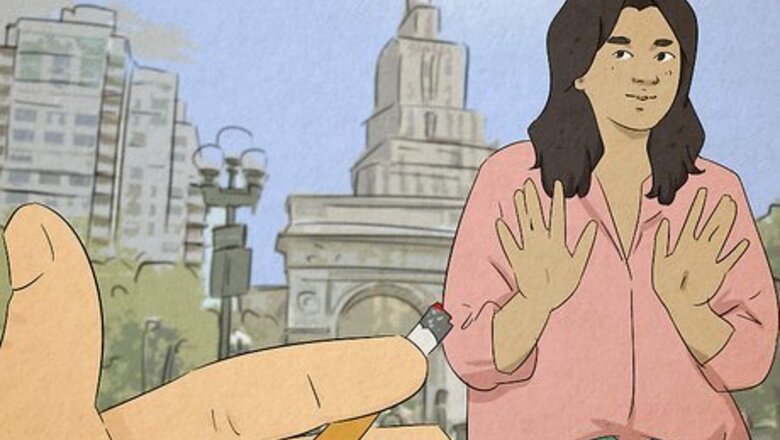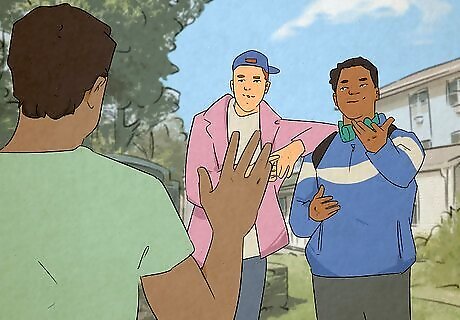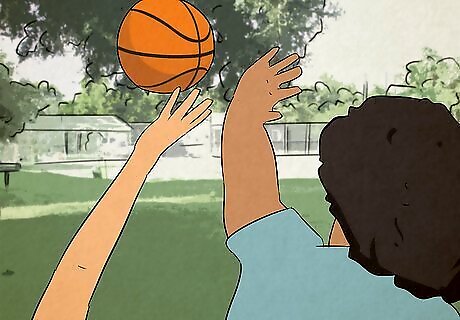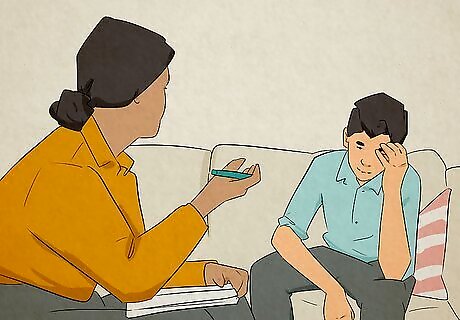
views
Responding to Peer Pressure in the Moment

Say ‘no’ like you mean it. The most basic way to respond to peer pressure is to just say ‘no.’ Standing up to peer pressure will save you the trouble of getting pressured again in the future because it sends a clear message that you're not interested. Be firm and make eye contact. This shows that you’re not willing to compromise. There are lots of ways to say no. For example, say, “I don’t do that” or, “No thanks, I’ll pass.” You can also say, “I’d rather not, thanks.” Be careful not to get baited into doing something by being called “scared” or “a chicken.” Stay firm in your own decision.

Change the subject if you’re uncomfortable responding to questions. Avoiding the question might send the message that you're still interested but don’t want to respond. That may lead to further pressure later on. Changing the subject, however, will at least buy you some time until you feel ready to respond (or not respond at all). Change the subject by saying, "Do you want to watch this movie with me? I've really been wanting to see it, but it's no fun watching it alone." If someone at a party is pressuring you into drinking, try asking "So what do you think of the DJ so far?"

Make an excuse to leave. This is a great option if you're feeling shy or intimidated, or if you don't want to come off as being rude. Come up with some sort of an excuse, apologize, and get away as soon as you can. For example: You could say “Oh, I just forgot, I have to study for the math exam," or "Oh my gosh! I just forgot that I have to meet Sue for that group project!" If the person is persistent, text your friend or your parent to call you. When your phone rings, pick it up, talk for a bit, then say you have to leave. Make sure that your excuse is believable. Don't mention that you have to talk to your sister if you don't have a sister.
Anticipating Peer Pressure

Make your own decisions. Do things that make you happy and make those decisions on your own. While some people might ask you to do something that pushes you outside your comfort zone in a good way, be mindful of any negative consequences that could occur. If you’re about to make a decision, ask yourself, “Is this good for me? Is this adding something positive to my life? Am I certain how I feel about it?" Don’t make decisions based on what other people think is good for you or what they want you to do.

Plan a response. Whether you haven’t experienced peer pressure yet or you want to respond better for next time, think of a response you can use if you’re ever asked something you don’t want to do. Having a response ready will mean you won’t feel under pressure if you’re asked and you’ll already know what to say. For example, think about something to say if someone asks you to cheat, lie, steal, or take drugs. You might use a generic, “Naw, no thanks” or have something different for each situation. Don't get sidetracked by talking others out of the idea. Make "I" statements and stay focused on your own position.

Avoid places and situations that make you uncomfortable. If you suspect that people are meeting up to drink alcohol or do drugs before an event, tell them that you’ll meet them at the event itself. Avoiding situations that might tempt you can help you avoid peer pressure altogether. If you're still in school, be weary of going to parties without adult supervision or meeting up with people you know do drugs. Trust your instinct. If something feels "off," don't hesitate to make other plans. If you start to feel uncomfortable during a party, don't be afraid to leave.

Choose positive friends. When dealing with peer pressure, start by choosing friends who won’t pressure you do things. Your friends should accept you for who you are without wanting to change you. If your friends don’t make bad decisions, you’re less likely to make them, too. Choose friends because you like them, not because they’re ‘cool’ or popular. They should like you for you and care about you. Try meeting people who share common interests with you. For example, if you see someone reading a book that you like, strike up a conversation with them about the book and get to know them.
Handling the Effects of Peer Pressure

Journal about your feelings. It can be difficult to deal with the feelings that come from peer pressure. You might be good friends with someone, then feel betrayed when they try to pressure you to do something. You might even wonder if the friendship is over or needs to end. Dealing with these emotions can be hard, so use a journal to sort out your feelings and help you cope with the stress. Your journal should be a safe place to write out your thoughts and feelings. Be honest with yourself as you write. You might want to reflect on your journal entries at times to see how you’ve dealt with things in the past and what was helpful before.

Choose a different friend group. Think about your good interactions with them versus your bad interactions. If you feel like they pressure you much more than you’d like or they won’t stop, make some new friends. While it’s hard to say goodbye to friends, it might be harder to keep saying "no" to peer pressure and deal with how it makes you feel. You can meet people by volunteering or attending karate, dance, or other classes. If you are still in school, audition for a play, try out for sports team, or join a club. Pick something that your current group of friends isn't involved in.

Keep busy with healthy activities. Another way to avoid peer pressure is to spend your time doing activities that you really enjoy. Doing activities can help you meet other people with shared interests and help you spend your time doing what you enjoy. Try different activities until you find one you like. For example, try a sewing or woodworking class, pick up photography, go hiking, or get a bike. See what clubs are available at school, like drama club, math team, and Big Brothers and Big Sisters. You can also join a sport like soccer, track, gymnastics, or volleyball.
Getting Support from Others

Use the buddy system. If you have a friend who has similar values, go places together. You can keep each other in check as well as look out for one another. Back each other up and support each other in making good decisions. For example, if your friend is having a hard time saying no, chime in and say, “We’re just leaving now and going to the mall.”

Talk to a trusted friend. If you’re struggling with peer pressure, talk to someone you trust. Your friend might have some advice for how they handle peer pressure that you could use. They can also help support you in handling peer pressure in the future. It’s okay to admit you’re struggling, and they will most likely want to help you. For example, try saying, “Ryan wants to cheat off of my homework but I don’t want to cheat. How do you handle these situations?”

Tell your parents. Your parents generally want to support you and help you succeed. If you’re struggling with peer pressure, turn to them for help. They might have some ideas for how to handle it. If nothing else, ask them to listen and understand your experience. They can at least give you a hug and tell you that they love you. Though it might be awkward or difficult to talk with them, think how much worse it would be to talk to them about how you followed your friends and got into serious trouble.

Attend therapy if you’re struggling and nothing seems to help. You can find a therapist by contacting (or having your parents contact) a local mental health clinic or your insurance provider. You can also get a recommendation from your physician or a friend. A therapist can help you learn to express your feelings better and build your confidence. Therapists are there to listen to you and offer advice. You can say anything you want without fear of judgement. Sometimes, a therapist just isn't a good match. If you don't feel comfortable around them or aren't making progress, don't be afraid to try a new therapist.




















Comments
0 comment